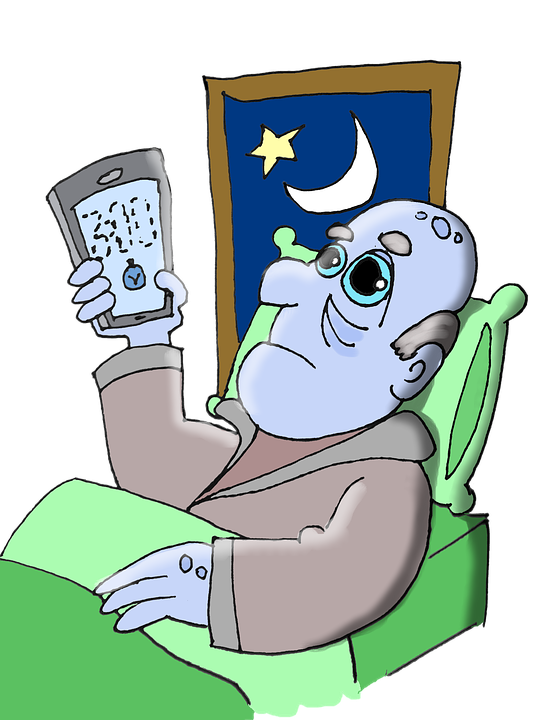 Don't sleep like this you may break your precious neck. (License: CC0, No attribution required]:Pixabay
Don't sleep like this you may break your precious neck. (License: CC0, No attribution required]:Pixabay It is for a fact that having sleeping hours less than six hours out of our precious twenty-four hours a day will in the long-run affect our heart and increase our chances of having cardiovascular diseases. This does not necessarily mean that sleeping more than six hours in a day is so healthy for our hearts and us. There is a long list of bad things that could happen to your health when you over-sleep - Side effects of oversleeping
A study carried out proved that having sleeping hours ranging between 6 and 9 for humans between age 18 and 64 is good for the brain, heart, mind and health. Having sleeping hours more than that could pose a problem - back to the main topic (Insomnia may be fun but it is not good for your heart) of discussion in this article. Insomnia means the inability of someone to sleep, especially at night. I had one friend who always hated sleeping because she strongly believed that "Sleeping is learning how to die" - As awkward as this may sound, she believed it and lived by that almost every day of her life in a bid to increase her life-span not knowing that she was indirectly making herself vulnerable to all illness that is affiliated with habitual sleeplessness.
 Don't let anything deprive you of a good night rest. (License: CC0, No attribution required]:Pixabay
Don't let anything deprive you of a good night rest. (License: CC0, No attribution required]:Pixabay This habit of sleeplessness that she developed costs her, her happiness and a sound mind. She always stayed up all night doing a lot of thinking that made her go into depression and lack of concentration in her work and in the real world. She became a total mess until She was taken to the doctor who helped her out with sleeping pills and then made her stop taking them gradually until she became fine and able to sleep well. I wouldn't want to bore us with my insomnia loving friend who got ruined and got back on her feet when she stopped the habitual sleeplessness through the help of a doctor.
The link between insomnia and heart disease has not been biologically clear but various studies have been carried out in the laboratory to uncover the mystery between insomnia and cardiovascular diseases. The most recent one carried out was that carried out on a mice to prove that indeed lack of sleep increases the risk of atherosclerosis and proper sleep regulates haematopoiesis.
 (License: CC0, No attribution required]:Pixabay
(License: CC0, No attribution required]:Pixabay
This proved to an extent that having a good night rest is indeed very good for your heart because as your body rests, so does your heart and blood pressure. Remember it is also not safe to rest for too long as that also could harm your heart. When you're deprived of sleep, especially a good night sleep, CRP is increased, discharged with pressure and stress inflammation and automatically poses a threat for heart disease.
There are different health conditions that can be linked to lack of sleep
Again the importance of adequate sleep (not too little or too much) cannot be overemphasized when it comes to our health. The first condition is the life-threatening high blood pressure. High blood pressure is the most popular condition that can be linked to inadequate sleep, as about seventy-five million Americans who are young adults are living with high blood pressure and most likely because of inadequate rest. Like I said earlier in this article when we sleep blood pressure decreases from what it is while we are awake. When we spend so much time awake, our blood pressure which is supposed to be low for the 7-8 hours a day stays higher for these extra hours we stay awake, increasing our risk of high blood pressure which in the long run may lead to stroke or heart disease.
Another notable health condition that can be linked to insomnia is Type 2 Diabetes. It is true that the most popular cause of the type 2 diabetes is when your body is "Insulin resistance" - that is your body is not able to efficiently use the adequate amount of insulin it's supposed to use to function adequately. Another cause of type 2 Diabetes is the level of sugar in the blood - Several studies have hinted the unavoidable role of adequate sleep in the regulation of blood sugar which automatically reduce the risk of type 2 diabetes. To add to this, type 2 diabetes can be developed from genes (It's hereditary) and way of life.
Obesity is another health condition that is connected to insomnia. This may sound like irony because you know, obesity is associated with eating, physical inactivity, oversleeping and gaining excessive weight. One may ask why insomnia would cause obesity - The truth is obesity can be associated with both oversleeping and insomnia. It is associated with oversleeping in the sense that you do lack much physical activity that should help you burn fat and is associated with insomnia in the sense that as we stay awake, we require more energy and tend to eat a lot of meals high in calories and carbohydrates which would eventually lead to weight gain and if not controlled would result in obesity.
In Conclusion
 A handshake always seal the deal and conclude a discussion ;) (License: CC0, No attribution required]:Pixabay
A handshake always seal the deal and conclude a discussion ;) (License: CC0, No attribution required]:Pixabay I personally, advice everyone of us to try to take our health seriously. The world mortality rate has been on the increase as technology and innovation advances - Teenagers and young adults are the most guilty of having too little sleep in a day and from surveys carried out, this is as a result of their mobile devices, laptops, video games, drugs etc. Parents should try to convince their children about the importance of adequate sleep and the health risks that are involved when we do not have adequate sleep.
This would go a long way in reducing the number of young adults living with high blood pressure, obesity etc. If you have a friend who thinks insomnia is a cool thing, you should refer him/her to have a look at this article. I hope you enjoyed your read and learnt something new today.
References
Mice experiment
Insomnia and heart failure
Sleep deprivation and Heart failure

This post has been voted on by the SteemSTEM curation team and voting trail in collaboration with @curie.
If you appreciate the work we are doing then consider voting both projects for witness by selecting stem.witness and curie!
For additional information please join us on the SteemSTEM discord and to get to know the rest of the community!
Basically meaning that my sleep schedule is going to kill me!
On a more serious note, some studies have analyzed that there may be a link between insomnia & heart disease.
On the other hand, there has been some firm link to hypertension & atherosclerosis, which for me as a Med student makes sense, as it may be more related to the stress caused by Insomnia rather than Insomnia itself.
However, the problem is that (as the articles say), there is a lack of consensus to "how is insomnia defined".
In any case, it would be interesting!